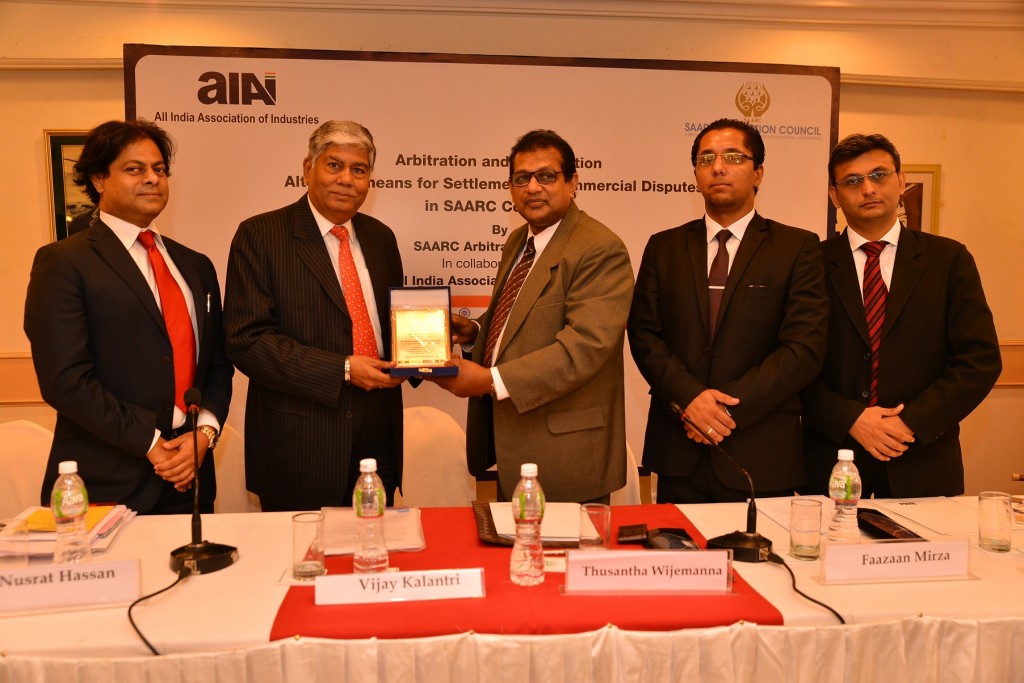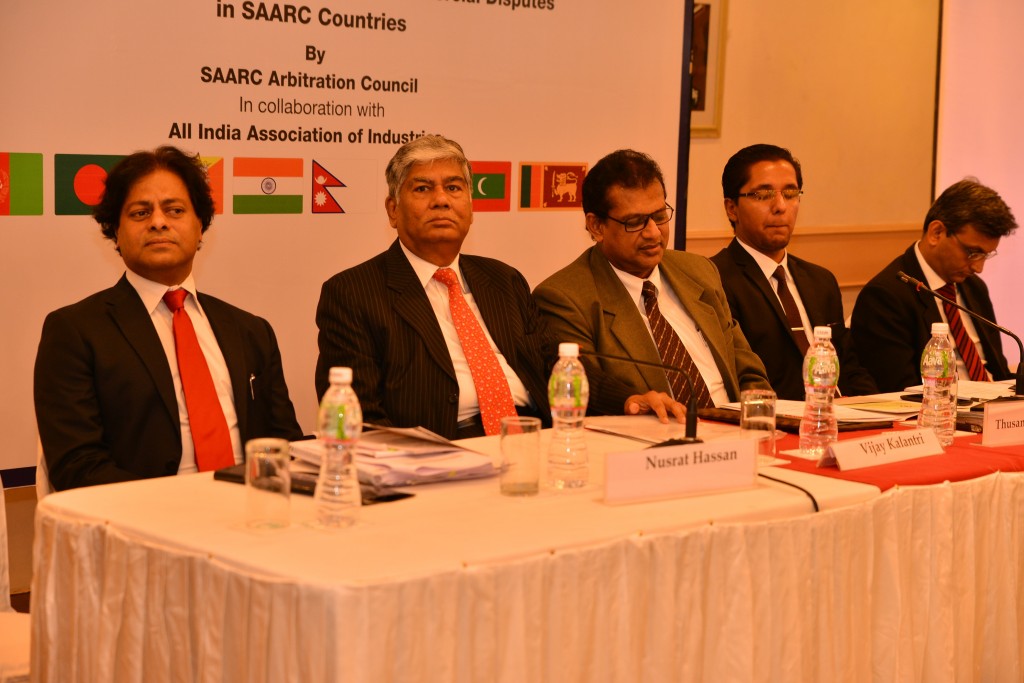- Home
- About
- Team
- About the President
- Mission
- Advisory bodies
- Associates
- Privacy Policy
- Terms and Conditions
- Cancellation, Returns & Refund Policy
- Pricing Policy
- Services
- Activities
- Events
- International Desk
- Sectors
- MSME
- Membership
- Publication
- Media
- Contact
Flawed legal systems impacting trade in SAARC countries- say legal experts
Flawed legal systems impacting trade in SAARC countries- say legal experts
SAARC Arbitration Council (SARCO) have initiated various regional awareness programmes to highlight the importance of settling disputes through arbitration which is the positive way to promote investments and trade in SAARC countries. Since setting up of the Centre in 2010, it has not got a single arbitration matter as most parties opt for Singapore, London and Hague as their seat of centre. Mr. Thusantha Wijemanna, Director General SARCO was speaking at the promotion Seminar on Alternate means for Settlement of Commercial Disputes- Arbitration and Conciliation in SAARC Countriesorganized by All India Association of Industries (AIAI) in association with the SARCO on August 21, 2015 at the CK Nayudu Hall, Cricket Club of India, Mumbai.
“The aim of setting up SARCO is to expedite the process to save time and money for the foreign investors. The legal experts cautioned against the flawed domestic laws in SAARC countries that are impacting trade and business. The business community doesn’t want solutions to be provided after many years, they would want to clear the hurdle and move on promptly which we do not see in the current juridical legal procedure,” Mr. Wijemanna stated.”
The only country after Singapore is India who had taken cognizance of the development of Arbitration. Since 1996, with the inception of Arbitration and Conciliation Act. However, from the time of this Act till September 2012 the Indian arbitration law did not follow the guidelines as per New York Convention for enforcement of Foreign Awards. Former chief justice, Justice Mane said, “The culture of misinterpretation of law needs to be stopped. The job of the judiciary is to support the process of arbitration through interpretation with the help of experts and give justice.”
Mr. Vyapak Desai, Partner & Head of International Litigation & Dispute Resolution Practice, Nishith Desai and Associates highlighted the era of post 1996 till BALCO case of September 2010, when for the first time in India one saw a change in arbitration. The legal fraternity said it was a matter of concern for foreign investors to see the courts interfering rather than being supportive. “There was immense concern as we saw the judiciary lose focus on arbitration. The judicial precedence was interpreting Acts rather than support. It was seen as judicial interference and we unfortunately we saw an export of arbitration cases to Singapore, London and Hague,”” said Desai. He pointed out that there has been a visible change from the judiciary and legislature since the call for Ease of Doing Business. “Since the time Mr Modi has called for Ease of doing business, we have seen that the judiciary and legislature have responded positively and things are improving. Now, India and the SAARC countries need to improve on their credibility for investors to seek a seat of centre in these countries, which is still not happening,” said Desai.
Mr. Nusrat Hassan, Managing Partner, DH Law Associates emphasized that the domestic award is a not streamlined and hardly an option for the companies to arbitrate in India. As a result the first option of seeking seat of centre is still Singapore or London for most foreign investors.
“The western countries prosper because the disputes are in control their judiciary is in place. The SAARC countries need to understand that arbitration is an instrument that promotes trade and business. Exporting disputes arbitration to other countries is not good,” said Hassan.
Mr. Hassan added that the issue for enforcement of arbitration is deficient in India and other SAARC countries.
Mr. Faazaan Mirza, Legal Research officer, SARCO gave a detailed account of the constitution of board and functioning of SARCO.
The eminent former justices Mr. Bhatia said that it is binding on every individual in the judiciary to eradicate the culture of backlog. “I recall that few other judges and I would dispose off the case at the admission stage itself. This saves delays, time and most of all cost of the litigants. This would automatically help reduce the backlog,” said Justice Bhatia. The current backlog registered as per the judiciary in India runs in such high volumes that it would take nearly 200 years to clear this back log.
Earlier, in his welcome address Mr. Vijay Kalantri, President, All India Association of Industries, highlighted the need for judicial reforms. “There is a bill pending in the parliament on judicial reforms and the arbitration in India. I hope it would be passed soon,” said Mr. Kalantri. He added, “Investors are scared of coming to India due to the misinterpretation of law by individuals at every level in the government and judiciary. It has definitely impacted our trade and foreign investments adversely and it is in our hands to correct it.”
Ms. Rupa Naik, Executive Director, All India Association of Industries felicitated the guests and proposed a vote of thanks
Mr. Thusantha Wijemana, Director General, SARCO presenting a memento to Mr. Vijay Kalantri, President, All India Association of Industries and looking on is from (L-R) Mr. Nusrat Hasan, Managing Partner, DH Law Associates Mr. Faazaan Mirza, Legal Research Officer, SARCO, and Mr. Vyapak Desai, Partner & Head of International Litigation & Dispute Resolution Practice, Nishit Desai Associates during a on Seminar on Arbitration and Conciliation Alternate means for Settlement of Commercial Disputes in SAARC countries organized by All India Association of Industries.
From (L-R) Mr. Nusrat Hasan, Managing Partner, DH Law Associates Mr. Vijay Kalantri, President,All India Association of Industries, Mr. Thusantha Wijemana, Director General, SARCO, Mr. Faazaan Mirza, Legal Research Officer, SARCO, and Mr. Vyapak Desai, Partner & Head of International Litigation & Dispute Resolution Practice, Nishit Desai Associates during a on Seminar on Arbitration and Conciliation Alternate means for Settlement of Commercial Disputes in SAARC countries organized by All India Association of Industries.
Recent Posts
Categories
- Agriculture
- Banking and finance
- Biotechnology
- Business Process Outsourcing
- Chemicals
- Defence
- Drugs & Pharmaceuticals
- Economic Affairs & Taxation
- Energy
- Engineering
- Exports & Imports
- Food Processing
- Food Processing
- ICTE Manufacturing
- Inbound delegation
- Information & Communication Technology
- Infrastructure
- Innovation
- Logistics
- Manufacturing
- Media & Entertainment
- Medium & Small Scale Industry
- Micro
- Oil and Gas
- Petrochemicals
- Ports
- Power
- Press Information Bureau-Government of India
- Press Release
- Press Release: Quanzhou Delegation Explores Business Collaboration in India
- Renewable Energy
- Tourism & Hospitality
- Uncategorized
- Women Empowerment
Archives
- July 2025
- June 2025
- April 2025
- March 2025
- January 2025
- December 2024
- June 2024
- May 2024
- April 2024
- March 2024
- January 2024
- November 2023
- October 2023
- September 2023
- August 2023
- July 2023
- June 2023
- May 2023
- April 2023
- March 2023
- February 2023
- January 2023
- February 2022
- January 2022
- December 2021
- November 2021
- October 2021
- September 2021
- August 2021
- July 2021
- June 2021
- May 2021
- April 2021
- March 2021
- February 2021
- January 2021
- December 2020
- November 2020
- September 2020
- August 2020
- June 2020
- May 2020
- April 2020
- March 2020
- February 2020
- January 2020
- November 2019
- August 2019
- July 2019
- May 2019
- April 2019
- March 2019
- July 2018
- June 2018
- April 2018
- February 2018
- January 2018
- December 2017
- November 2017
- October 2017
- September 2017
- August 2017
- July 2017
- June 2017
- May 2017
- April 2017
- March 2017
- February 2017
- January 2017
- December 2016
- November 2016
- October 2016
- September 2016
- August 2016
- July 2016
- June 2016
- May 2016
- April 2016
- March 2016
- February 2016
- January 2016
- December 2015
- November 2015
- October 2015
- September 2015
- August 2015
- July 2015
- June 2015
- May 2015
- April 2015
- March 2015
- February 2015
- January 2015
- December 2014
- November 2014
- October 2014
- September 2014
- August 2014
- July 2014
- June 2014
- May 2014
- April 2014
- March 2014
- February 2014
- January 2014


